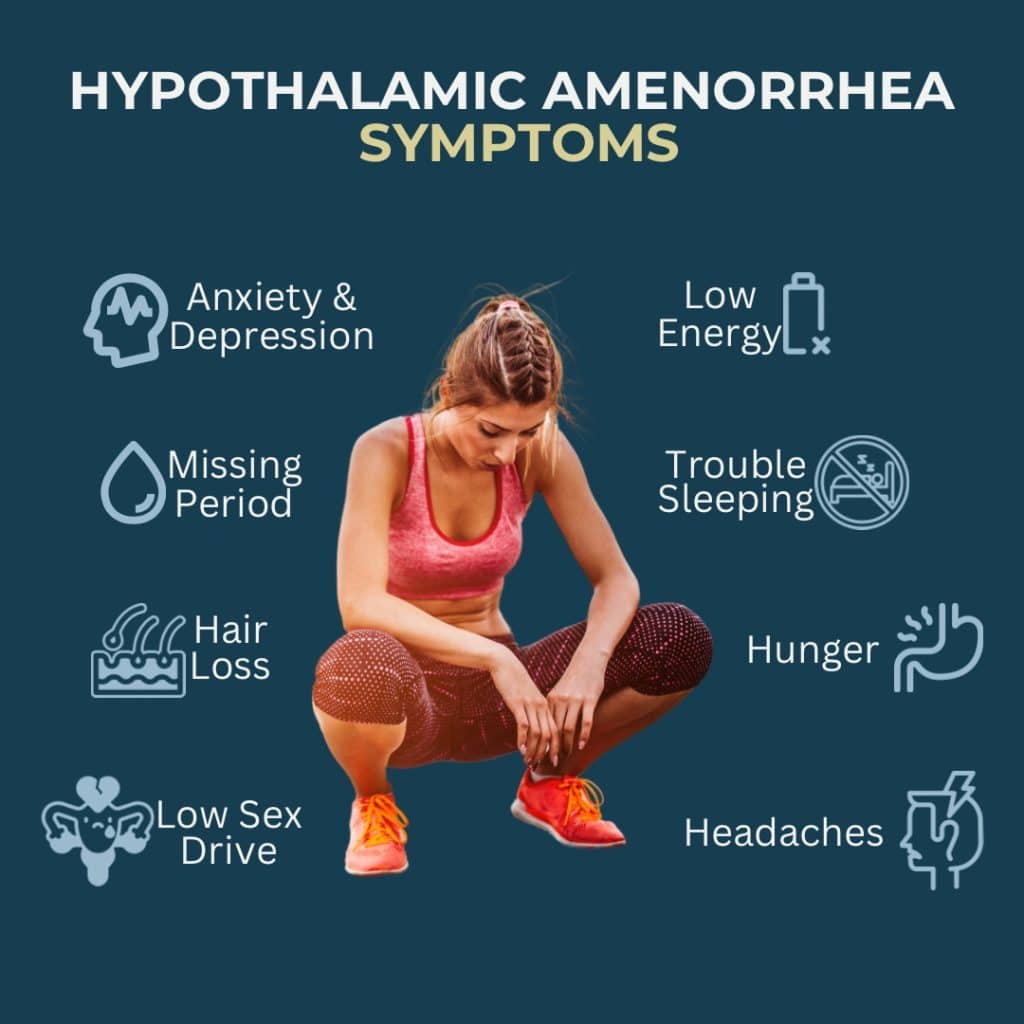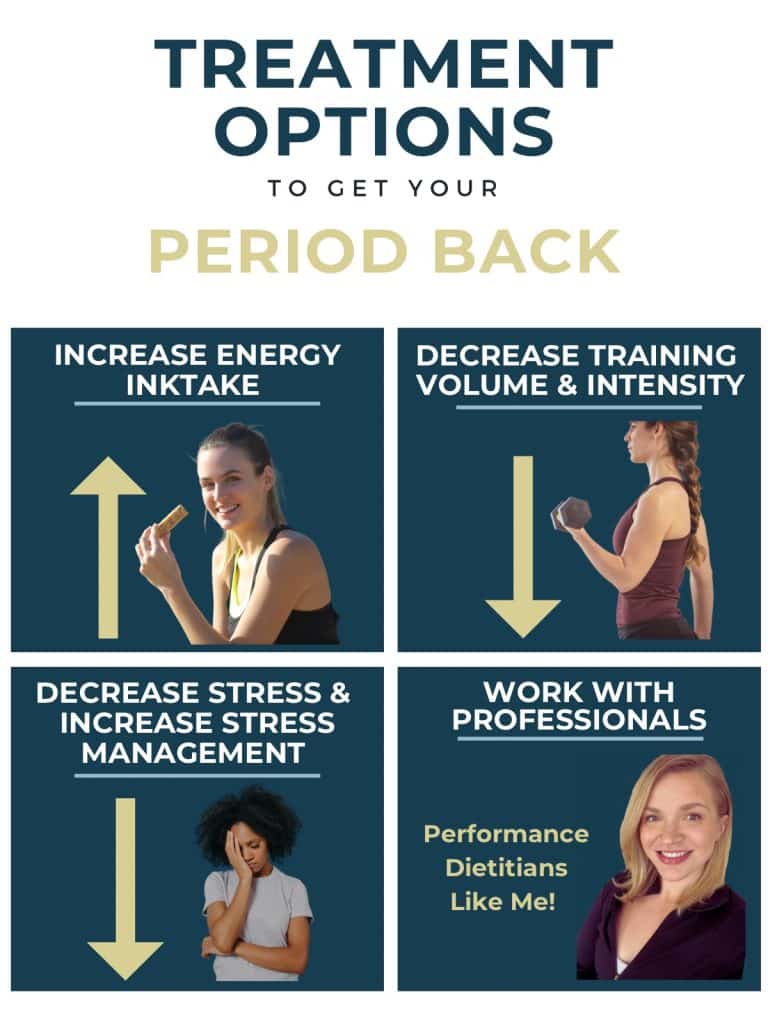While losing your period may not sound terrible, it can lead to long-term consequences. While period loss is common in female athletes, it should be considered abnormal and a health concern for females.
Getting your period back after losing it is a process. As a performance dietitian, I am here to help you get your period back and be a support system during your hormonal health journey.
In this post we will be discussing what a normal period is, hypothalamic amenorrhea (HA), why you lost your period, and how to get your period back. Let’s start…
What Does a “Normal” Period Look Like
Before we talk about how to get your period back, we need to demystify your menstrual cycle.
A normal menstrual cycle recurs in women every 26-35 days beginning at puberty (ages 10-16). During that cycle, our body goes through different phases that are dominated by hormonal changes.
Normally, gonadotropin-releasing hormone (GnRH) is made and released from the hypothalamus (a structure in the brain that keeps the body in balance by producing hormones). GnRH works on the pituitary (another hormone producer in the brain) to release follicle-stimulating hormone (FSH) and luteinizing hormone (LH). Those hormones act on the ovaries, which produce estrogen and progesterone that work on the uterus to go through the phases of the menstrual cycle.
At any point during this process if there is a disturbance it can cause amenorrhea (loss of period)
What is Hypothalamic Amenorrhea (HA)?
Foremost, Amenorrhea is the loss of one or more menstrual cycles. Amenorrhea affects as many as 61% of female athletes depending on the sport they play.
Hypothalamic Amenorrhea (HA) occurs when the hypothalamus slows down or stops producing GnRH. This occurs when the hypothalamus recognizes there is stress within the body. This results in the absence of periods for at least 3 months.
Hypothalamic Amenorrhea (HA) Long-Term Health Consequences
You may not think that losing your period is a big deal but it could lead to long-term health risks including:
- Cardiovascular Disease: A study of over 82,000 had an up to 50% increase in risk for future cardiovascular disease events
- Weak Bones: bone density and strength are all altered when in a long-term low-energy state. Fracture (specifically stress fracture) risk is more preventable in amenorrheic individuals.
- Fertility Issues: HA occurs during peak reproductive years resulting in anovulation and infertility when left untreated or prolonged.
- Depression: Estrogen helps regulate levels of serotonin, dopamine, epinephrine, and norepinephrine. Low estrogen levels in HA can lead to an increase in mood swings, sadness, anxiety, and depression.
- Low Self-Esteem: Amenorrheic women generally express more concern about their physical appearance and weight gain.

Symptoms of HA
A missing period is just one of the symptoms of HA other possible symptoms include:
- Low energy
- Anxiety and depression
- Trouble sleeping
- Hunger
- Hair loss
- Headaches
- Low sex drive
Why You Lost Your Period
As we learned, periods are regulated by hormones. When our hormones become out of balance, you’ll see changes in your period or miss your period altogether.
Now if you’re pregnant, breastfeeding, or in menopause, you should expect to be missing your period. But if you do not fall into those stages of life and you’re still missing your period here are some reasons you might not be getting your period.
Low Energy Availability
When we don’t eat enough to give our body enough energy for all basic functions, it starts to shut down less important functions that are not essential for survival. The menstrual cycle is an energy-intensive process that the body does not deem essential during times of starvation.
Therefore, when we don’t take in enough or diet too hard to sustain basic functions and activity, it could result in diminished hormone levels, bone loss, and missing periods.
Excessive Exercise
Often female athletes think that losing their period due to intense athletic training is normal. That is not true. Intense exercise routines combined with inadequate caloric intake can lead to an imbalance of hormone levels resulting in the loss of regular periods.
Stress
High levels of stress cause an increase in cortisol (a hormone) which suppresses GnRH. As we learned earlier in this post, when that hormone is low the hormones needed to produce ovulation and our period are also suppressed. The more stress we are under, the more GnRH is suppressed which leads to missing periods.
Disordered Eating
Athletes in high-performance environments are at a higher risk to experience body dissatisfaction which may impact their eating behaviors putting them at risk for disordered eating and low energy availability. The risk for an athlete to experience any form of an eating disorder is 13.5% which is higher than non-athletes at 4.6%.
Women struggling with eating disorders such as anorexia nervosa are at a higher risk of developing amenorrhea. This is likely due to inadequate calorie intake, significant weight loss, and low body fat percentage.
How to Get Your Period Back
Learning about this condition and the health consequences can be scary, but the good news is recovery is possible. Recovery will take time and hard work to make positive lifestyle changes.
Diet
It may sound simple but eating “enough” is a vital step to get your period back. A registered dietitian, like me, can play an important role by providing you with appropriate nutritional recommendations to help you meet your energy needs.
You need to eat enough to support your body’s vital functions (breathing, thinking, and your heart beating), non-exercise activities (cooking, cleaning, walking, shopping, etc…), and any exercise or training. This amount will be different for every person.
Exercise
It may be necessary to reevaluate your training intensity and volume. Even if you increase your energy intake while still training excessively, you most likely will not be able to meet your body’s energy needs. A decrease in training may be needed to make sure that you can eat “enough” to meet your energy needs to support reduced training and recovery.
Stress Management
One of the first steps into recovery is making sure that mentally you are in the right place to start your recovery journey. Working on your relationship with food and exercise may be necessary before you begin increasing food intake or decreasing exercise.
I recommend you build a support system of professionals such as psychologists and performance dietitians (like me!) to help you in your journey to recovery.

Final Thought
Not having regular periods is damaging to women’s health. Low energy availability, excessive exercise, stress, and disordered eating can all lead to hormonal imbalances. Those hormonal imbalances can lead to hypothalamic amenorrhea (loss of period).
While losing your period is scary, the good news is recovery is possible. The first step in the journey is to be in a place mentally where you are ready to make changes. This is where having a strong support system comes in.
Surrounding yourself with professionals who are passionate about helping you is important. Underfueling and fueling strategies are something that I work on with my clients. If you are looking for guidance, I encourage you to schedule a free discovery call today! I would love to support you in meeting your goals!

Jenn Fink is a licensed and board-certified Registered Dietitian Nutritionist based in Minnesota. Her goal is to help busy people and families prioritize their health by living a balanced lifestyle and feed their families flavorful meals without spending hours in the kitchen. Jenn is passionate about all things food-related and enjoys making complex science easy to understand for her clients and readers.

